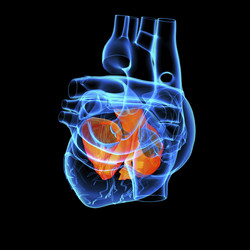Novel heart valve implants
At present, cardiovascular diseases (CVD) represent the most significant cause of death in the EU. CVDs affect the heart and the blood vessels leading to high blood pressure, coronary artery disease, heart valve disease and stroke. With respect to heart valve disease, the major causes include congenital heart defects that occur in one out of 100 new-borns in the EU. The heart valve transplantation approach suffers from issues such as immunogenicity, degeneration of biological transplants and a high risk of clotting in the case of mechanical valves. To address this, the EU-funded project ESPOIR (European clinical study for the application of regenerative heart valves) developed a promising technology to decellularise human heart valves prior to implantation. The rationale behind this approach is that the implanted heart valve is less immunogenic as it contains fewer antigens. It also facilitates recellularisation by recipient cells. Implants derived from donated, human heart valves are chemically treated first to inactivate adhering microorganisms and then to remove cells. Only connective tissue remains in the heart valve matrix, which is stable and can be stored and shipped. The implant was tested extensively in animals, and following immunological and toxicological analysis, it was found to be well tolerated and regenerated by recipient cells. During ESPOIR, over 120 patients within Europe were enrolled in the controlled prospective clinical trial at seven clinical centres to receive decellularised heart valves. Processed heart valves were implanted using standard surgical procedures with no adverse events relating to the mechanical stability of the decellularised matrix structure. Results of decellularised heart valves used for pulmonary valve replacement have been impressive: 99 % of those who have received cell-free heart valves have not needed follow-up surgery so far. Heart valve decellularisation can now be provided by one of the ESPOIR partners to any interested tissue bank or hospital fulfilling the European directives on tissue donation. Overall, the project successfully translated the innovative regenerative heart valve into widespread clinical therapy for congenital heart disease. Importantly, the approach can be extended to treat the increasing number of patients requiring aortic valve replacement.







